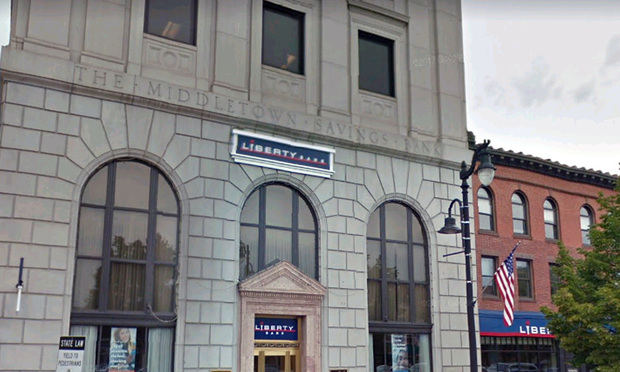Discrimination Against Customers Alleged in Liberty Bank Federal Suit
A two-year investigation by the Connecticut Fair Housing Center turned up, what a lawsuit alleges, was blatant racial discrimination in Liberty Bank's lending practices and where its banks are located. The suit seeks monetary damages.
October 05, 2018 at 12:53 PM
4 minute read
 Liberty Bank headquarters in Middletown. Photo: Google
Liberty Bank headquarters in Middletown. Photo: Google
A federal lawsuit alleging Liberty Bank has engaged in systematic racial discrimination in its lending practices and has engaged in unlawful redlining has been filed in the U.S. District Court in Connecticut.
The lawsuit, filed Thursday by the Connecticut Fair Housing Center and the National Consumer Law Center, lists numerous examples of alleged discriminatory practices.
The lawsuit states the bank, which is headquartered in Middletown and has 57 branches, engaged in “unlawful redlining to restrict residential mortgage lending from communities where most residents are individuals of racial and ethnic minorities” and was discriminating against “African-American and Latino residential mortgage applicants in the application process by denying applications at significantly higher rates than white applicants.” Redlining is the practice of denying services, either directly or selectively raising prices, to residents of certain areas based on the racial or ethnic makeups of those areas.
The plaintiffs in the case sent white and minority testers to different branches to check their theories, and the results were striking, according to Jeffrey Gentes, managing attorney for the Connecticut Fair Housing Center and one of five attorneys representing the plaintiffs in the suit.
“We did six tests, and the first one, done at the bank's Southington branch, was the most glaring. We had a loan officer treating an African-American woman completely different from a white customer,” Gentes told the Connecticut Law Tribune Friday. Both women, he said, had similar credit scores. The tests were done in December 2016 and January 2017.
“The loan officer expressed skepticism of the African-American woman's credit score and whether her debt would pose a hurdle for her qualifying,” Gentes said, adding, “They accepted when the white tester said 'Here is my credit score.”'
In addition, Gentes said, “He quoted the African-American woman higher closing costs and asked her how big her family was. He also referred to her husband as “hubby.” He did not do that with the white tester.”
Gentes said he was not surprised by the two-year investigation of Liberty's lending practices from 2010 through early 2017 or of the results from the testers at various bank branches. “When you read our complaint and the specifics of it, it's offensive. It is everything we are fighting against. I am not surprised this is happening in 2018 because this happens a lot. Connecticut is a segregated state and there are extreme wealth disparities here.”
While other banks, Gentes said, also “do a bad job” in their lending practice, Liberty, he said, “is the worst in the state. We did not bring this suit lightly and we made a lot of efforts to rule out other causes that may help Liberty explain why the results were the way they were. We sided on giving Liberty the benefit of the doubt. We were careful about this.”
In response to the lawsuit, Liberty Executive Vice President and Chief Marketing Officer Patricia Jatkevicius issued a statement Friday afternoon.
The statement reads: “Liberty Bank learned about the action taken by the Connecticut Fair Housing Center and the National Consumer Law Center just before the close of business yesterday. We take all allegations with regard to the bank, its practices and the treatment of customers very seriously. We are actively looking into the matter and are unable to comment further at this time.”
The scathing lawsuit also says “Liberty Bank has met the credit needs of majority-white neighborhoods in Connecticut while avoiding lending in majority non-white neighborhoods” and has “gerrymandered CRA [Community Reinvestment Act] assessment areas that cut-off the Hartford-East Hartford racially diverse center of the state and generating significantly fewer applications for credit from majority non-white neighborhoods than its competitors.”
The suit seeks unspecified monetary damages to the Connecticut Fair Housing Center and asks the court to declare that Liberty has violated the Fair Housing Act and asks the court to enjoin its employees from discriminating because of race or national origin in any aspect of its lending business practices.
Gentes was joined in filing the suit by colleagues Greg Kirschner and David Lavery and by Stuart Rossman and Jeremiah Battle of the National Consumer Law Center.
This content has been archived. It is available through our partners, LexisNexis® and Bloomberg Law.
To view this content, please continue to their sites.
Not a Lexis Subscriber?
Subscribe Now
Not a Bloomberg Law Subscriber?
Subscribe Now
NOT FOR REPRINT
© 2025 ALM Global, LLC, All Rights Reserved. Request academic re-use from www.copyright.com. All other uses, submit a request to [email protected]. For more information visit Asset & Logo Licensing.
You Might Like
View All


DC Lawsuits Seek to Prevent Mass Firings and Public Naming of FBI Agents
3 minute read
Trending Stories
- 1Supreme Court Denies Trump's Request to Pause Pending Environmental Cases
- 2‘Blitzkrieg of Lawlessness’: Environmental Lawyers Decry EPA Spending Freeze
- 3Litera Acquires Workflow Management Provider Peppermint Technology
- 4'I Can't Do This': Judge Blocks $16M Alex Jones Settlement
- 5TikTok Opts Not to Take Section 230 Immunity Fight to U.S. Supreme Court
Who Got The Work
J. Brugh Lower of Gibbons has entered an appearance for industrial equipment supplier Devco Corporation in a pending trademark infringement lawsuit. The suit, accusing the defendant of selling knock-off Graco products, was filed Dec. 18 in New Jersey District Court by Rivkin Radler on behalf of Graco Inc. and Graco Minnesota. The case, assigned to U.S. District Judge Zahid N. Quraishi, is 3:24-cv-11294, Graco Inc. et al v. Devco Corporation.
Who Got The Work
Rebecca Maller-Stein and Kent A. Yalowitz of Arnold & Porter Kaye Scholer have entered their appearances for Hanaco Venture Capital and its executives, Lior Prosor and David Frankel, in a pending securities lawsuit. The action, filed on Dec. 24 in New York Southern District Court by Zell, Aron & Co. on behalf of Goldeneye Advisors, accuses the defendants of negligently and fraudulently managing the plaintiff's $1 million investment. The case, assigned to U.S. District Judge Vernon S. Broderick, is 1:24-cv-09918, Goldeneye Advisors, LLC v. Hanaco Venture Capital, Ltd. et al.
Who Got The Work
Attorneys from A&O Shearman has stepped in as defense counsel for Toronto-Dominion Bank and other defendants in a pending securities class action. The suit, filed Dec. 11 in New York Southern District Court by Bleichmar Fonti & Auld, accuses the defendants of concealing the bank's 'pervasive' deficiencies in regards to its compliance with the Bank Secrecy Act and the quality of its anti-money laundering controls. The case, assigned to U.S. District Judge Arun Subramanian, is 1:24-cv-09445, Gonzalez v. The Toronto-Dominion Bank et al.
Who Got The Work
Crown Castle International, a Pennsylvania company providing shared communications infrastructure, has turned to Luke D. Wolf of Gordon Rees Scully Mansukhani to fend off a pending breach-of-contract lawsuit. The court action, filed Nov. 25 in Michigan Eastern District Court by Hooper Hathaway PC on behalf of The Town Residences LLC, accuses Crown Castle of failing to transfer approximately $30,000 in utility payments from T-Mobile in breach of a roof-top lease and assignment agreement. The case, assigned to U.S. District Judge Susan K. Declercq, is 2:24-cv-13131, The Town Residences LLC v. T-Mobile US, Inc. et al.
Who Got The Work
Wilfred P. Coronato and Daniel M. Schwartz of McCarter & English have stepped in as defense counsel to Electrolux Home Products Inc. in a pending product liability lawsuit. The court action, filed Nov. 26 in New York Eastern District Court by Poulos Lopiccolo PC and Nagel Rice LLP on behalf of David Stern, alleges that the defendant's refrigerators’ drawers and shelving repeatedly break and fall apart within months after purchase. The case, assigned to U.S. District Judge Joan M. Azrack, is 2:24-cv-08204, Stern v. Electrolux Home Products, Inc.
Featured Firms
Law Offices of Gary Martin Hays & Associates, P.C.
(470) 294-1674
Law Offices of Mark E. Salomone
(857) 444-6468
Smith & Hassler
(713) 739-1250










